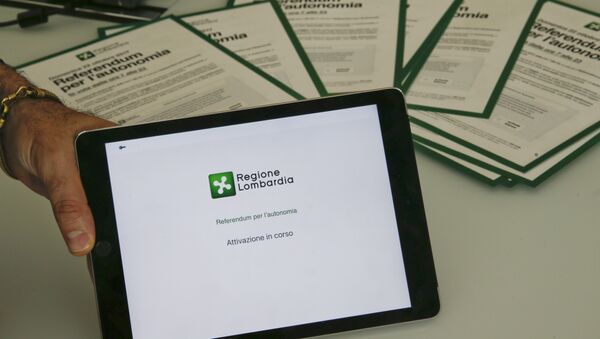As Northern Italy's direct economic competitor, Catalonia, becomes less attractive to corporations, Lombardy and Veneto hope that more autonomy will help them to woo the investors fleeing the UK in search of economic stability after Brexit.
Sputnik spoke to Lorenzo Cologna, Founder and Chief Economist at LC Macro Advisors Limited, about the Northern Italian regions impetus for autonomy.
Sputnik: How appealing is the region of Lombardy, Veneto and Milan for investors?
Lorenzo Cologna: Well I think that particularly in Milan is attractive for investors because it's a combination of good infrastructure, a lot of activity right now, the economy is booming. There's a lot of investment going on and there's a good environment in terms of skills. I think in particular Milan, but also Lombardy and Veneto, at least by Italian standards, are rich and in a better position than others to attract foreign investors.
Sputnik: Why has Lombardy President Roberto Maroni shied away from a full secessionist referendum?
Lorenzo Cologna: I think that the Northern League has become some sort of far-right movement, in line with the Front National, Le Pen in France, or the Alternative for Deutschland (AfD) in Germany. They no longer claim to separate the northern part of Italy from the rest of the country, but they want a kind of strong devolution process.
I think the referendum called in Lombardy and Veneto is indeed part of this process — that the Northern League wants to get more autonomy for these two regions, they are the only ones currently governed by the Northern League.
Sputnik: We've seen this time and again, is giving more autonomy the answer or is there a better economic solution?
Lorenzo Cologna: Devolution in Italy started in 20 years ago and hasn't really been very successful, keep in mind that half of the government spending comes from the local government, not the central government, and again there's not enough control sometimes. So I think it's good to have devolution, but only if you have proper presentation in Rome, which was the idea of the referendum last year.
We had one of the two chambers come in to the local chamber of government. Secondly you have to have monetary and strict controls, because money expenditure aside, the risk is that it deteriorates. But if you meet these kinds of requirements then devolution is a good phenomenon.
Sputnik: Should Veneto and Lombardy gain more autonomy, would this give the impetus and power to later go for independence? Would this have been a better model for Catalonia to follow?
Lorenzo Cologna: Well, it's is pretty different because you know in Catalonia, that [independence] was the objective in the very first place. In Veneto and Lombardy, the political force claiming for independence is no longer doing so well.
There are a number of other forces that are supporting a referendum. This includes the Democratic Party (PD); the local members of the PD said voters can vote for whatever they like, so basically most political parties right now are in support the referendum.
If the referendum goes through and the region starts getting more autonomy, eventually you will have forces pulling apart the whole country without proper reform of the constitution. So you'll have to allow more autonomy at a local level and eventually they will be more need for a change in the constitution, otherwise, you'll end up with different regions wanting more autonomy without a general framework.

